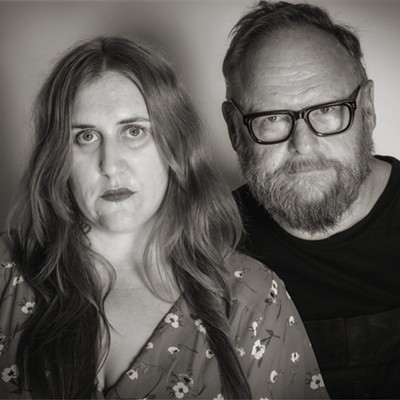What you might not know is that Shedd is a recent Tucson transplant: She and her husband and backing guitarist, James Tritten, moved here about a year ago from Jacksonville, Fla.
Before then, Shedd was the touring act, with local bands opening up for her--she first played Club Congress back in 2002 while on tour for her first album, 2001's Blue (Teenbeat). She's released two full-length albums on Teenbeat, and a third, 2004's Louder Than You Can Hear, on Devil in the Woods. Her music is reminiscent of friends The One A.M. Radio, or of indie slow-core bands like Bedhead.
It's definitely a testament to our homegrown musical community when musicians like Tracy Shedd become a part of it.
"Tucson has the small-town feel that Jacksonville had to offer, but yet a cultural community similar to a big-city," said Shedd. "People go out and do things here; they support the arts in general. It's also nice to know everyone around town when you go out. It's the best of both worlds."
So far, Tucson has been good to Tracy Shedd. She just finished her fourth album, Cigarettes and Smoke Machines, which will be released early next year and was recorded with Craig Schumacher at Wavelab.
"Moving here has created an opportunity for me to take on my music full-time. I am now able to spend time focusing on the arrangement of my music--more than I have in the past--and songwriting in general," said Shedd. "I am also spending time relearning piano. I was classically trained in my early teenage years and am looking forward to introducing piano into my songwriting."
Shedd started writing songs in 1994 when her first band, Sella, lost their drummer. "We had a show opening up for Rein Sanction, a local band from Jacksonville, Fla., on Sub Pop Records, at the legendary club Einstein's A Go-Go in two weeks," explained Shedd. "I went out and bought my first guitar and just began writing."
Since then, Shedd's music has gone from sparse to lush and back again; Blue is mostly Shedd's angelic voice, bright and crisp guitar, and quiet drums. Red, released in 2003, moves into louder and more orchestral frames, and on Louder Than You Can Hear, Shedd and Tritten's quiet/loud and soft/edgy contrasts are in full form.
"I love noisy My Bloody Valentine/Sonic Youth-sounding guitars, yet also appreciate softer sounds like Kings of Convenience or José González," said Shedd. "I think that's what people like about the dynamics between James' playing and myself. Around Tucson, we've been playing as a duet. James is playing a loud, out-of-control, at times, noisy guitar, and I am playing acoustic. I think it works for now, but I do miss playing with a full band at times."
Cigarettes and Smoke Machines, said Shedd, is "not far off from my previous work, just a little more refined. ... It has intimate, pop, rock and noise moments. It's like a mixture of all three of my previous albums."
Part of what makes Cigarettes and Smoke Machines more refined, explained Shedd, is that she had more time to develop the songs. Louder Than You Can Hear was recorded on a strict deadline. "I think it was an unhealthy pressure," said Shedd. "The band sort of went on a hiatus after that record. I purchased an acoustic guitar and spent more time focusing on being a singer/songwriter and less of a bandleader. Moving out to Tucson obviously broke up my band, sort of. Mainly, when I'd write a song, I wasn't worried about if bass and drums would work. I think that's why this album is a bit more diversified in instrumentation. I guess you could say the influence for Cigarettes and Smoke Machines would be regaining my independence as a songwriter."
Onstage, Shedd's independence as a songwriter is clear--at a recent show at Plush on a rainy night, Shedd's songs filled the room. With just her acoustic and Tritten's electric guitar accompanying her voice, each note expanded into the room, so that even in their quietest moments, each song was powerful and warm. Some of the titles alone evoke provocative images, like "Remember the Time We Set the Highway on Fire." Shedd proves that slowcore can still create immense amounts of creative energy, and perhaps the best parts about Shedd's move to Tucson are that we can get these sneak previews of her new album, and get the chance to be supportive of her music on a local level.
"I love how everyone is so supportive of each other and how they all collaborate together. I feel there is a lot of creative energy, and it is very easy to express myself here. This city has a lot to offer an artist," she said.









